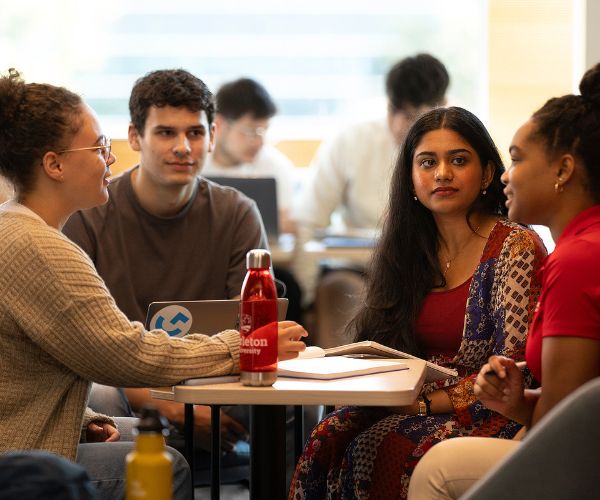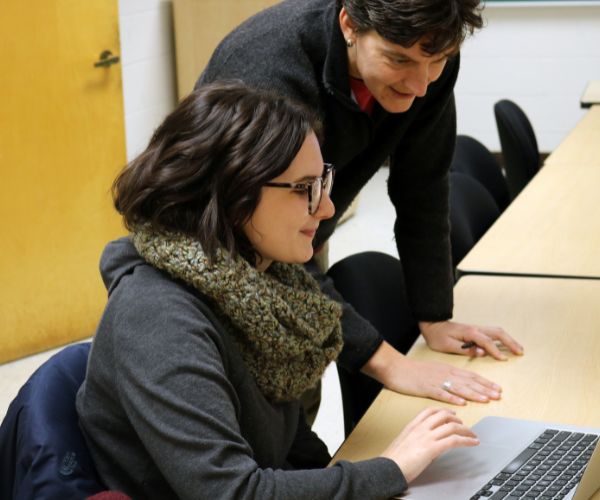Visit Carleton! Book your tour today.
Program Details
Anthropologists study human beings, globally and cross-culturally, and recognize that each way of life is but one possibility among many. In a pluralistic world, where people from different places and backgrounds frequently interact, anthropology is an important tool for helping us understand each other and the rapid changes going on around us. Anthropology offers the potential to broaden our understanding of what it means to be a person, to question what passes as “normal” or “natural”, and to examine the world we inhabit as interconnected by environmental, political, economic, cultural and social forces.
While anthropologists have traditionally studied in small scale, non-Western societies, today we apply our participatory research methods and a combination of humanistic and social scientific perspectives to all kinds of situations: if people do it, you can study it as an anthropologist.
Carleton’s anthropology program specializes in socio-cultural anthropology, which is the study of contemporary societies and cultures through direct engagement, participant-observation and other qualitative methods. You will develop your ability to write, research, analyze ideas, synthesize information, and compassionately interpret the world in which we live.
Work Experience
You will have the option to participate in Co-op, complete a field placement in a workplace or write an independent honours research paper. Courses in community engagement combine practical experience and academic learning.
Exceptional Faculty
Our faculty work in various contexts and communities in Alaska, Argentina, Brazil, Canada, El Salvador, Ecuador, Lebanon, Morocco, Mozambique, New Zealand, Spain, Thailand, and Sierra Leone, among others. Our faculty specialize in a range of topics including:
- the study of Indigenous people’s lives in context (e.g. indigenous-state relations; governance & colonialism; language; urban indigenous communities).
- environmental issues (e.g. human-environmental relations; subsistence politics; the Anthropocene; climate change; natural resources)
- transnational & global issues (e.g. transnational adoption; international development; migration; diaspora; sex tourism)
- race, ethnicity, and nationalism (e.g. ethno-history; ethno-politics)
- selfhood, personhood, subjectivity, identity, psychiatric anthropology, and phenomenology;
- genders and sexualities (e.g. motherhood; reproductive health; gendered childhood; feminist theories/methodologies).
- political economy (e.g. global capitalisms; processes of commodification; capitalist and non-capitalist societies)

Get started in Carleton360 to receive tailored information on our programs, student services and community.

Career Outcomes
Explore your passions, refine new skills and discover the career that’s right for you.
The skills learned through the study of anthropology are highly transferable and will prepare you for a wide range of careers.
Sample Careers
- Advertising
- Advocacy
- Community Organizing
- Consultancies
- Counselling
- Education
- Environment
- Foreign Service
- Immigration Services
- International Development
- Journalism
- Management
- Marketing
- Mediation
- Museology
- Museums and Historical Sites
- Non-Governmental Organizations
- Public Health
- Public Policy Development
- Research
- Social Work
- Urban Planning
- User-Experience Research

Sample Courses
ANTH 1050 - Race, Racialization and Racism: Critical Reflections
This course explores historically grounded contemporary dynamics of race, racialization processes and racism. Learners will link their own experiences with key theoretical concepts such as settler colonialism, slavery, racial capitalism, the racial state, systemic racism, and global whiteness.
ANTH 3045 - Children and Childhood in a Globalized World
A socio-historical and cross-cultural exploration of constructions, deconstructions, and the experience of childhood in Canada and internationally. Compulsory schooling, child labour, protection and regulation in law, the commodification and equalization of childhood, children's social movements, and the emergence of children's rights discourses.
Visit the Undergraduate Calendar to view a comprehensive list of course offerings for this program and discover the exciting things Carleton students are learning in the classroom!
Featured Stories
Read exciting stories from the Faculty of Arts and Social Sciences
Paula Rodrigo’s fourth year Honours Research Project looked at how Carleton students navigate Ottawa’s public transit system. The project combined surveys, interviews and ethnographic research methods to gain comprehensive user experience (UX) insights into how riding public transit shapes students’ conceptions of place and time. Through her project, she explored her interest in walkable cities and championed the voices and perspectives of university students when it comes to urban planning and infrastructure decision-making in Ottawa. Throughout her degree, Paula completed three Co-op terms with a UX focus (one with Nokia, the other two with the federal government).



